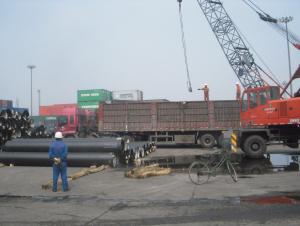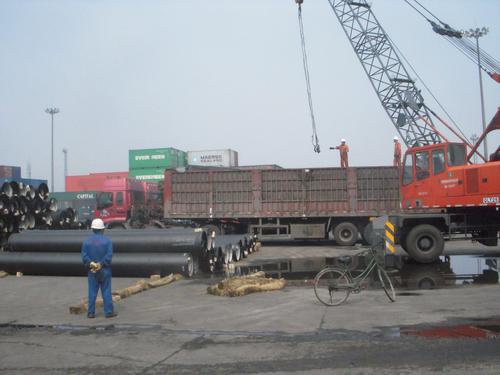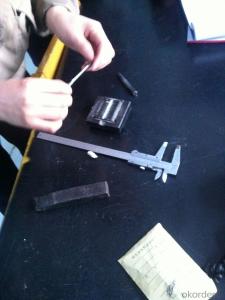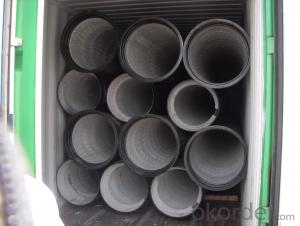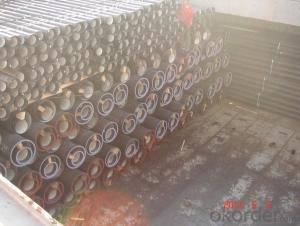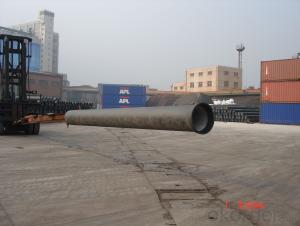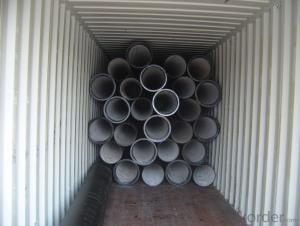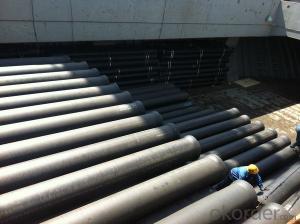DUCTILE IRON PIPES AND PIPE FITTINGS K8 CLASS DN300
- Loading Port:
- Tianjin
- Payment Terms:
- TT OR LC
- Min Order Qty:
- 22 pc
- Supply Capability:
- 3000 pc/month
OKorder Service Pledge
OKorder Financial Service
You Might Also Like
Material : Ductile Cast Iron
Size Range : DN 80mm to DN 2000mm
Unit Effective Length : 6m or 5.7m
Manufacture Standard: ISO 2531:1998/ EN 545:2006/EN 598:2007
Annual capacity : 200,000 tons
Coating Exterior: Zinc 130g/m2 according to ISO 8179-1 and bitumen coating 70 microns.
Cement Interior: Portland Cement/ High Alumina Cement/ Sulphate Resisting Cement Lining according to ISO 4179
Special requirements on external coating and internal lining can be applied
We also provide accessories such as SBR/EPDM rubber gaskets, lubricant paste, pipe caps, PE sleeves, etc.
Additional Parts:
Each pipe is strictly inspected according to related standard to ensure permanently high performance.
Easy Installation at site and service free for life
Long Service Lifespan
Quotation will arrive you within 24hours once we get your inquiry.
We guarantee offering you a competitive price.
A copy of original inspection reports of pipes will be offered after shipment.
Photos of loading process will be sent to the customer after shipment effect.
We will follow-up the delivery progress after shipment effect and update to the customer on weekly basis.
- Q: What are the typical applications for ductile iron pipes?
- Ductile iron pipes are commonly used in various applications due to their unique properties and advantages. Some of the typical applications for ductile iron pipes include: 1. Water Supply Systems: Ductile iron pipes are extensively used in water supply systems, including municipal water distribution networks, as they provide excellent resistance against corrosion and have high durability. They can withstand high pressure and offer long service life, making them ideal for transporting potable water. 2. Wastewater and Sewage Systems: Ductile iron pipes are also widely utilized in wastewater and sewage systems. They can handle the transportation of sewage and other wastewater effectively due to their strength and resistance to chemical corrosion. These pipes are commonly used in underground sewer lines, sewer force mains, and wastewater treatment plants. 3. Industrial Applications: Ductile iron pipes find applications in various industrial sectors. They are commonly used for transporting different types of fluids, such as chemicals, slurries, and abrasive substances. Their strength, toughness, and resistance to external loads make them suitable for industrial pipelines, including those in power plants, refineries, and mining operations. 4. Irrigation Systems: Ductile iron pipes are frequently employed in irrigation systems for agriculture, landscaping, and golf courses. These pipes can withstand high water pressure and provide a reliable solution for transporting water over long distances. Their corrosion resistance ensures water quality is maintained, and their durability reduces the need for frequent maintenance. 5. Fire Protection Systems: Ductile iron pipes are widely used in fire protection systems, including sprinkler systems and fire hydrants. Their strength and ability to withstand high pressure make them suitable for delivering water rapidly in case of fire emergencies. These pipes are also resistant to heat, making them a reliable choice for fire protection applications. In summary, ductile iron pipes are versatile and widely used in various applications, including water supply systems, wastewater and sewage systems, industrial pipelines, irrigation systems, and fire protection systems. Their durability, corrosion resistance, and ability to withstand high pressure make them a preferred choice for these applications.
- Q: What is the expected thermal expansion coefficient of ductile iron pipes?
- The expected thermal expansion coefficient of ductile iron pipes typically ranges from 10.8 to 12.2 x 10^-6 per degree Celsius.
- Q: Can ductile iron pipes be used for water supply in remote areas?
- Ductile iron pipes are indeed suitable for water supply in remote areas. Renowned for their strength, durability, and versatility, these pipes are capable of serving various purposes, including water supply systems. Notably, their exceptional resistance to corrosion and ability to endure harsh environmental conditions renders them an ideal choice for remote areas with limited maintenance and repair services. Moreover, in comparison to alternative materials, ductile iron pipes boast a significantly longer lifespan, ensuring the sustained operation of water supply systems in remote areas. In summary, the reliability of ductile iron pipes for water supply in remote areas is attributable to their resilience, resistance to corrosion, and extended lifespan.
- Q: How do ductile iron pipes handle thermal cycling in industrial applications?
- Ductile iron pipes are known for their exceptional ability to handle thermal cycling in industrial applications. Thermal cycling refers to the fluctuation in temperature that occurs during the operation of various industrial processes. These pipes are designed to withstand the stresses caused by thermal expansion and contraction, making them highly suitable for environments with significant temperature variations. One of the key characteristics of ductile iron pipes is their high thermal conductivity. This means that they can efficiently conduct heat away from the hot areas, minimizing the impact of thermal cycling. Additionally, ductile iron pipes have a low coefficient of thermal expansion, which means that they expand and contract at a slower rate compared to other materials. This helps to reduce the stresses imposed on the pipes during thermal cycling. Furthermore, ductile iron pipes have excellent mechanical properties, including high tensile strength and impact resistance. These properties enable the pipes to withstand the mechanical stresses that may arise due to thermal cycling. They can resist the formation of cracks or fractures, ensuring the integrity and longevity of the pipes in industrial applications. Moreover, ductile iron pipes have a high resistance to corrosion and oxidation. This is particularly important in industrial settings where the pipes may be exposed to aggressive chemicals or harsh environments. The corrosion resistance of ductile iron pipes ensures that they can withstand the corrosive effects of the process fluids and gases, even during thermal cycling. In summary, ductile iron pipes are well-equipped to handle thermal cycling in industrial applications. Their high thermal conductivity, low coefficient of thermal expansion, excellent mechanical properties, and resistance to corrosion make them a reliable choice for environments with significant temperature variations. These pipes can effectively withstand the stresses caused by thermal cycling, ensuring their durability and longevity in industrial settings.
- Q: What is the difference between ductile iron pipes and cast iron pipes?
- Ductile iron pipes and cast iron pipes differ in terms of their composition and physical properties. Ductile iron pipes are made from ductile iron, which is a type of cast iron that contains nodular graphite in its microstructure, making it more flexible and resistant to cracking. On the other hand, cast iron pipes are made from gray cast iron, which has a gray, brittle structure due to the presence of graphite flakes. Ductile iron pipes are stronger, more durable, and less prone to damage, making them suitable for high-pressure applications and areas with heavy traffic loads. Cast iron pipes, although more brittle, are known for their corrosion resistance and are commonly used for water and sewage systems.
- Q: Can ductile iron pipe be used for industrial process piping?
- Yes, ductile iron pipe can be used for industrial process piping. Ductile iron pipe is known for its strength, durability, and corrosion resistance, making it suitable for various industrial applications including process piping. It can handle high-pressure and high-temperature environments, making it a reliable choice for transporting fluids and gases in industrial settings.
- Q: Can ductile iron pipes be used in contaminated groundwater systems?
- Contaminated groundwater systems can indeed utilize ductile iron pipes. Renowned for their strength and durability, ductile iron pipes are versatile and applicable in various settings, including water and wastewater systems. These pipes possess corrosion-resistant properties that safeguard against both internal and external corrosion, thus ensuring reliable water transportation, even in the presence of contaminated groundwater. When addressing contaminated groundwater, it becomes imperative to assess the extent and nature of the contamination. Ductile iron pipes exhibit resistance to numerous common chemicals typically found in groundwater, including specific acids and alkalis. However, in instances of severe or specific chemical contamination, it may be necessary to explore alternative pipe materials that offer superior resistance to those particular substances. Moreover, the proper installation and maintenance of ductile iron pipes are vital for their long-term performance within contaminated groundwater systems. Regular inspections, cleaning, and the use of suitable protective coatings can effectively mitigate any potential risks associated with contamination. In conclusion, ductile iron pipes can be effectively employed in contaminated groundwater systems, provided that the level and type of contamination fall within acceptable limits and appropriate installation and maintenance practices are observed. It is always advisable to seek guidance from experts and consider local regulations and guidelines when determining the suitability of pipe materials in specific groundwater systems.
- Q: What is the expected abrasion resistance of ductile iron pipes?
- Ductile iron pipes possess a high level of abrasion resistance, which is widely acknowledged. These pipes are renowned for their durability and strength, making them suitable for a range of applications, such as the conveyance of water, sewage, and other fluids. The composition of ductile iron pipes, containing significant amounts of carbon and silicon, contributes to their ability to withstand abrasion. The design of ductile iron pipes is specifically tailored to withstand the abrasive forces that can arise during fluid transportation. These pipes feature a smooth internal surface, which reduces friction and minimizes the risk of abrasion. Moreover, the inherent toughness and resistance to wear and tear exhibited by the material make ductile iron pipes less susceptible to damage caused by abrasive particles or debris present in the fluid flow. However, it is crucial to understand that the expected abrasion resistance of ductile iron pipes can vary depending on several factors, including the velocity and nature of the transported fluid, the presence of corrosive substances, and the installation conditions. In certain instances, additional protective measures, like linings or coatings, may be necessary to bolster the pipes' resistance to abrasion. In conclusion, ductile iron pipes are renowned for their exceptional abrasion resistance, but it is always advisable to consider specific application requirements and seek advice from experts to ensure the appropriate selection and installation of the pipes, thereby guaranteeing optimal performance and longevity.
- Q: Can ductile iron pipes be used for gravity sewer systems?
- Certainly! Gravity sewer systems can utilize ductile iron pipes. Ductile iron pipes boast durability, strength, and corrosion resistance, making them appropriate for a range of purposes, such as sewer systems. These pipes possess remarkable tensile strength and can endure substantial pressure and heavy loads, which renders them well-suited for gravity sewer systems where wastewater naturally flows rather than requiring pumping. Moreover, ductile iron pipes boast an extended lifespan and necessitate minimal maintenance, thus proving to be a cost-efficient option for sewer infrastructure.
- Q: The plug connection DN800 ductile iron pipe has been installed. "Shall I think so?"
- In many areas of our country, ductile iron pipe in the middle and small diameter to tube connected with the tube, the bearing type or flange interface method; ductile iron, angle limit must be allowed better seismic performance and sealing performance.
Send your message to us
DUCTILE IRON PIPES AND PIPE FITTINGS K8 CLASS DN300
- Loading Port:
- Tianjin
- Payment Terms:
- TT OR LC
- Min Order Qty:
- 22 pc
- Supply Capability:
- 3000 pc/month
OKorder Service Pledge
OKorder Financial Service
Similar products
Hot products
Hot Searches
Related keywords
